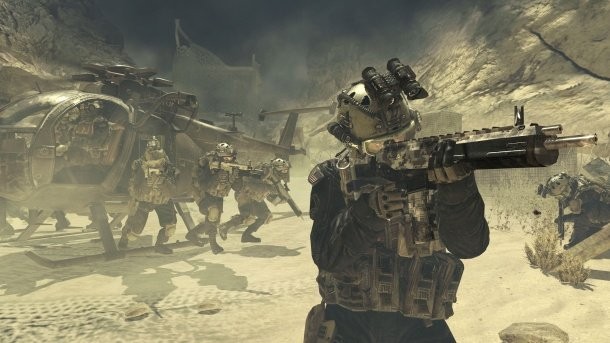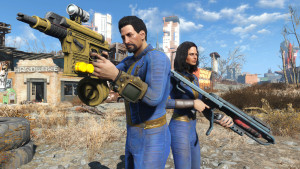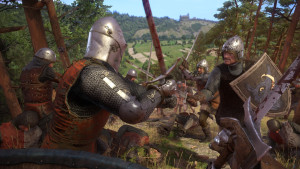Please support Game Informer. Print magazine subscriptions are less than $2 per issue
The Activision Lawsuit: What It Means And Where It's Going

News hit late yesterday that ex-Infinity Ward studio heads Jason West and Vince Zampella are suing Activision, their former employer. Today, we've received a boatload of new details on that lawsuit through the public court documents (originally posted on Kotaku). I've given the 16-page complaint a couple read-throughs, but rather than attempting to interpret it all on my own, I talked with Eric Chad, an intellectual property attorney with the firm Merchant & Gould. Chad provides some insight into why Activision may have made the choices they did, how relevant the info provided in West and Zampella's complaint is, and just how ugly and lengthy this legal battle could get.
For someone who's completely new to this type of legal document, the biggest surprise was that about 10 of the 16 pages are fairly clear and easy to follow, providing a semi-narrative set of anecdotes about the various problems West and Zampella have faced from Activision over the past few years. Some items I found particularly interesting:
-After acquiring Infinity Ward in 2002, Activision CEO Bobby Kotick told West and Zampella "that they should, and needed to, fight to preserve the 'magic' at Infinity Ward and focus above all else on maintaining its record of top-rated games."
-Following the release and success of the original Call of Duty: Modern Warfare, West and Zampella almost didn't renew their contract with Activision. The duo clearly wanted Infinity Ward to develop a new intellectual property, but they were being pressured by Activision to move right into Modern Warfare 2. From the document:
"Despite assurances by Activision that West and Zampella would have complete freedom to run Infinity Ward as an independent studio, Activision had begun to intrude upon Infinity Ward's ability to create quality games. For example, Activision forced Infinity Ward's employees to continue producing the games at a break neck pace under aggressive schedules, and West and Zampella were concerned that Activision was emphasizing quantity over quality. Given Activision's insistence that Infinity Ward continue to focus on sequels to Call of Duty games instead of new intellectual property, West and Zampella were also concerned that Activision's demands risked 'burning out' the Infinity Ward employees' creativity."
-Activision eventually convinced West and Zampella to stay with them by offering up a Memorandum of Understanding. In addition to extending their contracts through to October 2011, this legally-binding document gave West and Zampella some major financial bonuses as well as a couple other hefty promises. Chiefly, it gave the two "creative authority over the development of any games under the Modern Warfare brand (or any Call of Duty game set in the post-Vietnam era, the near future, or the distant future) including complete control over the Infinity Ward studio." In other words, Activision could not publish a Modern Warfare-branded game (or a Call of Duty game set any time later than Vietnam) without West and Zampella's full approval.
The Memorandum also promised the duo the ability to "operate Infinity Ward independently and to choose to develop new intellectual property after they completed Modern Warfare 2." Taken with the implied desire to move on to new things from the quote above, that probably means West and Zampella weren't looking to have Infinity Ward develop Modern Warfare 3.
-Sometime at the beginning of February or earlier, Activision launched an investigation into West and Zampella that the complaint alleges "was not to uncover any facts concerning any actual wrongdoing, but to manufacture a basis to fire West and Zampella." The details get downright scary here, with the duo saying that Activision refused to provide them with specifics on what they were being accused of, "insisting instead in Orwellian fashion that West and Zampella 'already have a clear understanding of what they have or have not done.'" The complaint notes that any time West or Zampella questioned the proceedings, they were told that anything but full cooperation would be counted as insubordination, thus justifying the firing in and of itself. Activision supposedly demanded access to their personal computers and cell phones and interrogated them for six hours straight in a windowless conference room on Presidents' Day weekend. Yikes.

While these accusations have raised an understandable amount of ire from the hardcore gaming community, Chad believes they may not matter as much when the case actually goes to trial:
"There's two sides to every story. I'm sure Activision's will come out eventually. When people file a complaint, they often dress it with that sort of rhetoric, because they're trying to use that document persuasively. In this case, clearly it's working. A lot of people who are viewing the situation seem to be of the opinion that Activision has been acting very shady and unethically, which is something that I think that a lot of people -- particularly gamers -- are likely to feel anyway."
"Reading the documents, I can understand how one would feel that the situation is unethical or unfair, but a lot of that story is not necessarily relevant to what the ultimate resolution of the claim will be," Chad continues. "You may feel that it's damning, and if all the allegations are true, I would agree with you. But ultimately a lot of those things are probably largely irrelevant. What this is gonna come down to is what the contract and this Memorandum of Understanding say."
Frustratingly, those key pieces of evidence are not likely to be revealed to the public. In the complaint, West and Zampella have offered to submit the Memorandum of Understanding only once the court has issued a protective order, a common practice for "commercially sensitive documents" (as Chad puts it) that will prevent the documents from being released to the public.
Based off of Activision's early response to the lawsuit and their search for files tying West and Zampella to EA and other competitors, Chad thinks the court's decision is likely going to come down to a couple of factors. "There's this rumor circulating now that West and Zampella may have been going behind Activision's back and talking to EA or other publishers," he says. "Obviously, I haven't seen the contract, but I would guess that sort of courting would have been a violation of the contract if it took place. A lot of times -- it's different with all contracts -- but once a side breaches the contract, all bets are off. If that's the case, it may be that Activision legally doesn't have to live up to its side of the bargain."
Interestingly, regardless of how sketchy their exit may have been, Chad notes that Activision didn't necessarily do anything wrong in getting rid of West and Zampella, even if many of their accusations are correct. "At this point, Activision owns Infinity Ward, and they were employees," Chad says. " I understand that they were very valuable employees, but unless there's an indication of real wrong-doing, you and I can be fired for any reason. There doesn't need to be a good reason. Employees are employees at will. I understand that all of it seems damning and seems unfair, but I think that there's a lot that's going to have to come out before the court or a jury is going to be able to make a judgment on these events."
Chad also suspects that Activision must have had motives for getting rid of West and Zampella beyond the immediately obvious financial reason:
"Obviously, I don't know what the full situation is, and it may be the case that Activision is acting very shady and engaging in shady business practices. I don't know that. But whatever Activision is saving if they don't end up paying these royalties -- which it looks like what they're asking for is $36 million -- they would make way more than that by having these guys associated with Modern Warfare 3. That's worth way more than $36 million. I personally have a hard time believing that Activision did this just to save $36 million. I don't know. I don't know the full situation, but I just have a hard time believing that."

Based off of my own novice understanding of the court complaint and the info Chad has provided, I'm seeing three likely possibilities beginning to emerge in the case. Keep in mind that these are purely speculation and in no way represent any definitive truth behind the situation:
a.) West and Zampella have publicly clashed with Activision before, and the court documents above prove that they were clearly unhappy with some aspects of their relationship with the publisher. Though their contract tied them to Activision until late 2011, it's possible that they actually had begun talking with other publishers about potentially switching teams in the future. If someone higher up in Activision somehow caught wind of this, it's feasible that they'd want to move quickly to terminate the duo's contracts.
b.) The Memorandum of Understanding described in the complaint strongly suggests that West and Zampella intended to begin creating a new intellectual property with Infinity Ward instead of Modern Warfare 3. In addition to that potential problem for Activision, if the complaint is correct about what was promised in the Memorandum, the duo also had the power to veto any plans for a Modern Warfare 3 from another developer. While saving the $36 million in royalties is a nice bonus, looking for a way to get rid of West and Zampella may have been a long-term investment for Activision, solidifying their ability to expand and exploit the Modern Warfare and Call of Duty franchises in ways that wouldn't be possible under the rules of the Memorandum of Understanding that they had signed.
c.) Perhaps most likely, the truth could be some tangled mix of the above situations, where both party's dealings and motives are at odds with each other. Determining who exactly was in the right legally will not be easy.
Whatever the truth ends up being, there's one question that many gamers will be eager to see resolved: What's going to happen to the Modern Warfare franchise? I ask Chad if it's possible that the franchise could end up being taken away from Activision:
"I can definitely imagine a set of circumstances where that would be the case, yes. [West and Zampella] wouldn't be able to call [future Modern Warfare games] Call of Duty, I don't think. I think Activision owns that, though it seems like Infinity Ward has abandoned that trademark anyway. But depending on what that contract and what the memorandum of understanding say.... If it really does give these two guys the control over that franchise, then that is what it is. They could go take it elsewhere if they felt like they needed to, unless Activision has some legal way to prevent it. I'm guessing -- although I wouldn't know for certain -- that when Activision files its answer, there may be counter-claims. Activision may be suing these guys too."
We'll know whether that's the case when Activision responds to the complaint, which will probably be a few weeks from now. But we've still got plenty of time to wait for a conclusion to all of this. Given the antagonistic relationship between West and Zampella and Activision, Chad doesn't expect an out of court settlement is likely. Barring that, and given the amount of money and the future of the Modern Warfare franchise at stake, "it'll probably be a year or two before it's resolved if it goes all the way to jury trial."
Hope you ordered the extra-large tub of popcorn, everyone.










